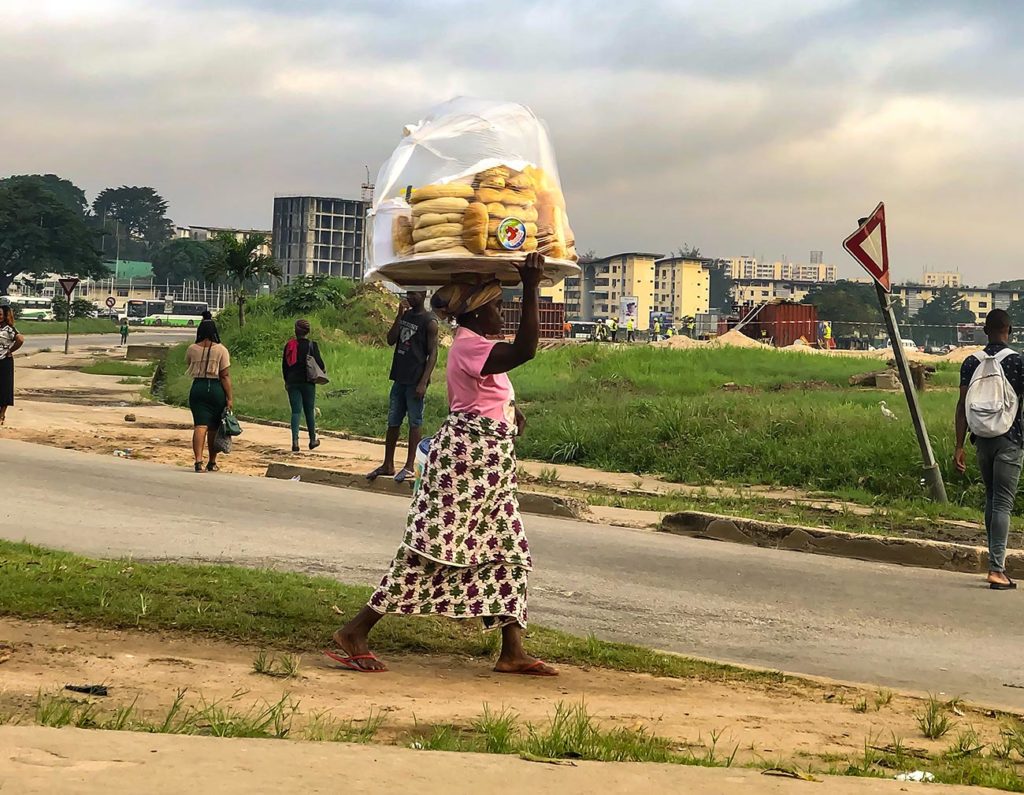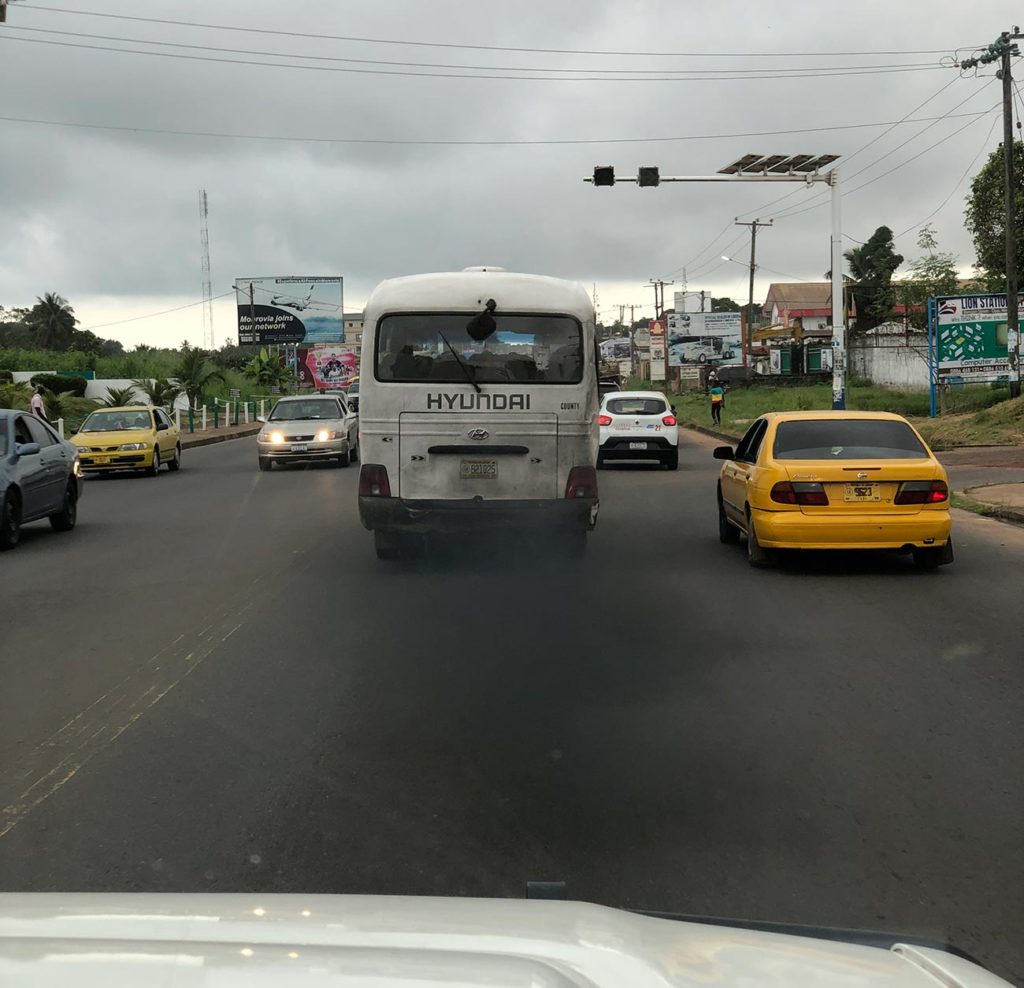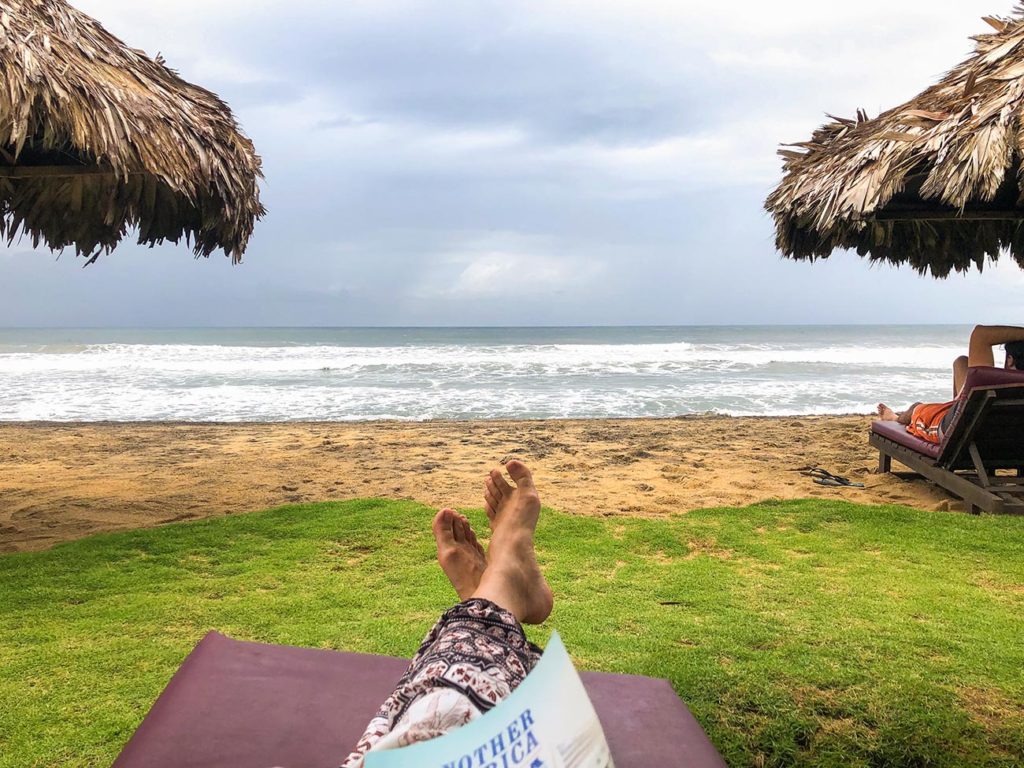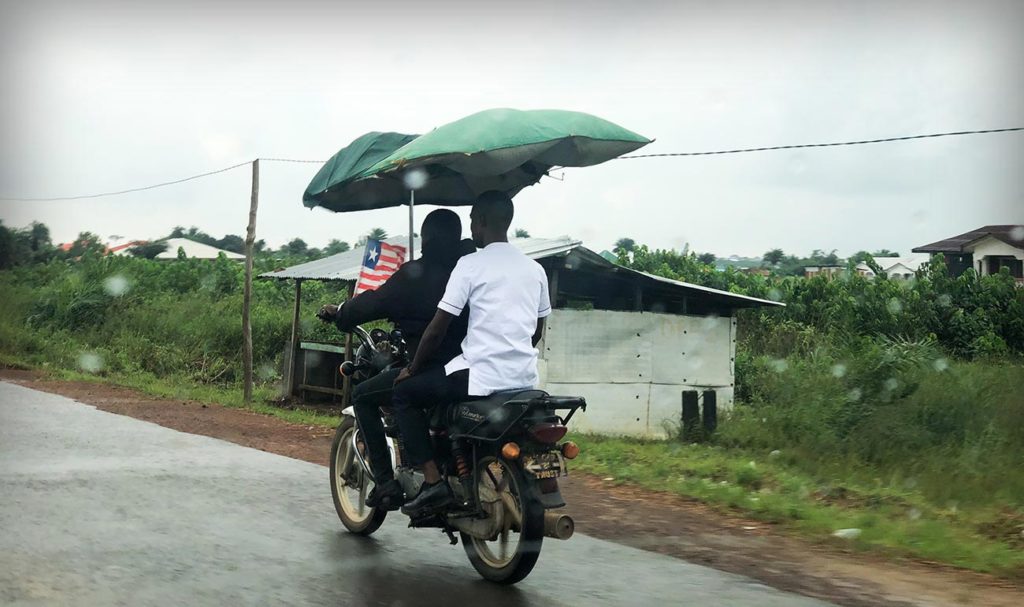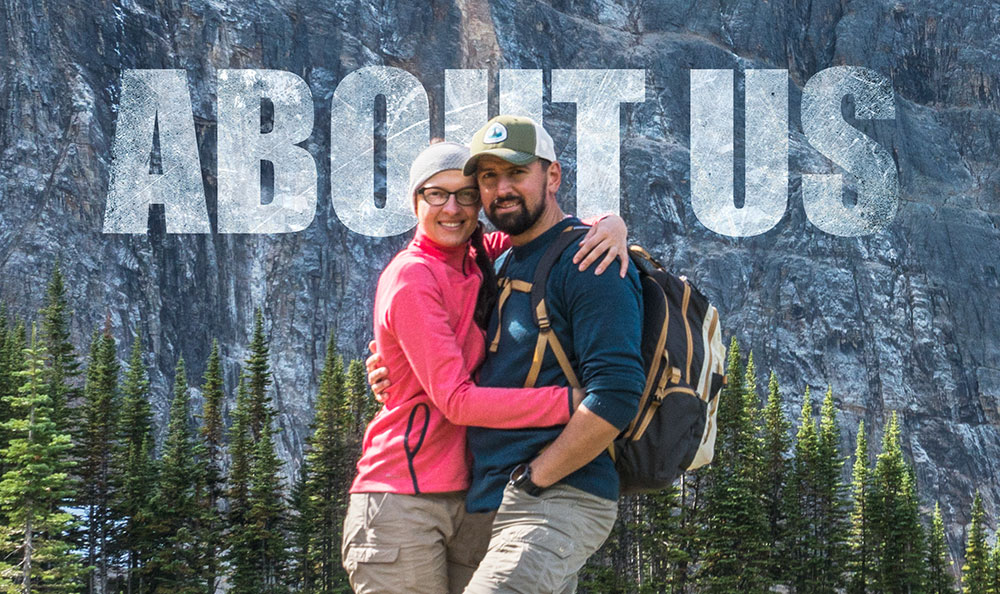Life in Liberia
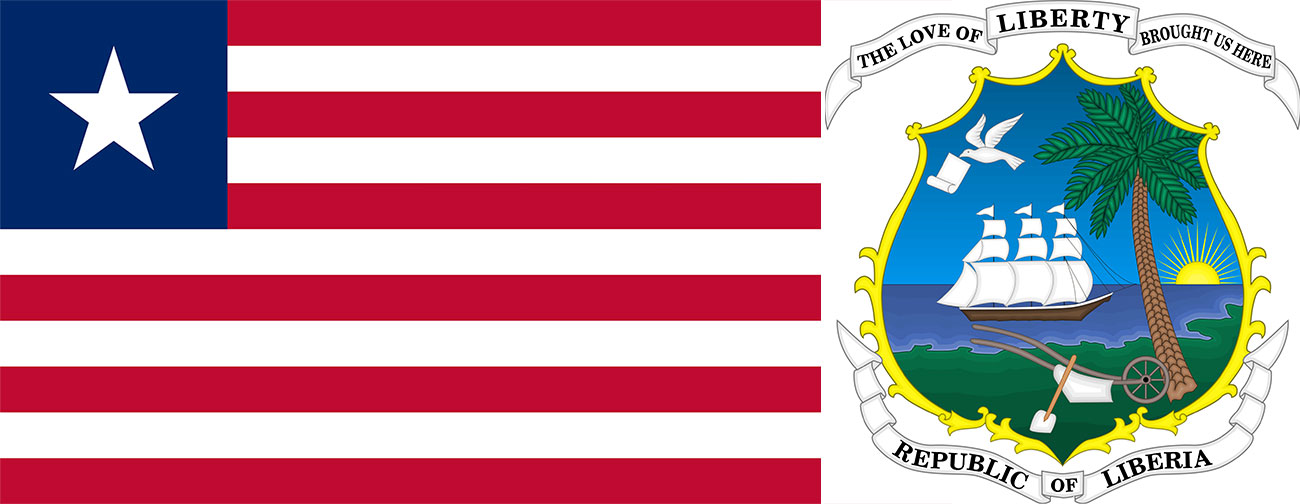
Liberian Flag (on the left) – resembles American flag with only one star signifying the freedom the ex-slaves were given by The United States. Liberian Coat of Arms (on the right) – depicts the first ship that settlers traveled on to arrive in Liberia.
I knew very little about Africa, Liberia and non-profit work before signing up for this assignment. I felt like it is important to know a few significant events in history of Liberia to better understand the foundation that makes up this nation.
About Liberia*
1820 – 1847:
- First settlers, freed slaves from US, arrive to Liberia.
- Upon embarkment, 1/3 of emigrants die from tropical diseases.
- The ones who survive and build the immunity struggle with harsh climate of wet downpours of the rainy season and scorching heat of the dry season.
- Coastline is too rocky to cultivate for farming, while inland is so overgrown by jungle that when attempts are made during the dry season, the next rainy season washes away all the efforts.
- People of the Republic of Liberia are declared to be the free slaves from America.
- Natives, who outnumbered the settlers by 25-50 to 1, were strangers in their own land, subject to Liberian law but excluded from citizenship.
1870:
- Liberia borrows $0.5 mil debt form London bankers in hopes to reinvest this capital into country’s economy.
- The deal ended up being so poor, where Liberia paid more than $650,000 for a payment of less than $250,000. A financial hole out of which their government would not dig itself until early 20th
- Such poor deals were often due to lack of financial acumen by Liberian representatives and opportunism and racism on the part of creditors.
1909
- Investigation by US commissioners revealed that the treasury has been empty.
- The role of treasury secretary usually went to a political insider with little experience in budgeting or even bookkeeping.
- The corruption of the coast and the extortion of the hinterland radiated from Monrovia. The government payroll was bloated.
1924 – Firestone Deal
- Yet again, Liberia seeks to find a creditor who would land $5 million.
- Firestone steps up to the plate, but in exhange secures his rubber plantation deal – a 99 year lease for a million acres of land for 6 cents an acre per year.
- As part of the deal, Firestone would pay no taxes, other than 1% levy on exports, which wouldn’t start for another 6 years.
1927
- According to the Guinness Book of World Records, the most fraudulent election in history was at the 1927 presidential contest in Liberia. Presidential contest was won with roughly 235,000 votes when there were only 15,000 eligible votes in the whole republic at the time.
- A big scandal uncovered that Liberian natives were leased out by private settler labor contractors (aka settlers were practicing slavery on natives).
1980
- Natives and settlers shared a territory that on maps read” Republic of Liberia” but little else.
- Constitution’s opening line read as “We the people of the republic of Liberia were originally inhabitants of the US”.
- 133- year rule of Americo-Liberian elite was ended when a young sergeant, Samuel Doe – a tribesman native, has organized an operation to assassinate current president.
- Unfortunately, when Doe took over presidency, his policies favored his own native tribe, while Liberia consisted of 16 ethnic groups.
1989 – 2003
- A civil war breaks out with death toll estimates with no less than 100,000 out of a population of 2.5 million.
- However corrupt, unjust, incompetent and occasionally brutal the Americo-Liberian regime of settlers had been, its crimes paled in comparison with the dictatorships, invasions, assassinations and unspeakable horror that followed during the war.
- The electric grid and running water were so severally damaged, leaving the nation with little to no access to water or electricity.
2014 – 2016
- Nation started to slowly build up after events of the civil war when largest Ebola outbreak fell on Liberia.
*Reference: James Ciment: Another America The Story of Liberia and the Former Slaves Who Ruled It
My Liberia:
One of the things that struck me was how similar is the economical state of affairs in the country today with its past history. It almost seemed like not much has changed. High corruption, drastic contrast between rich and poor, inflated salaries of government officials where some make up to $20,000 per month when an average Liberian lives on a few dollars per day. Country’s plentiful natural resources are given away to international investors who make poor deals with the government (just like Firestone and many others). Local cheap labor is exploited but most of the resources are not processed in the country which takes away potential for further economic development. A country where 60% of annual budget goes to pay government official’s salaries. A country where 95% of the budget goes to cover running costs, leaving only 5% for potential investment into economic development. A country where only 20% of population in the capital has electricity and running water.
Fourteen years of civil war followed by the biggest Ebola outbreak left a devastating impact on the mental well being of Liberian people.
Another important contributing factor is the educational gap that was created by the war (1989-2003). Today, Liberians in the age group of 30-40s should drive the economy. However, this age group has been affected by war when families fled Liberia to neighboring countries as refuges. Outside of trying to stay alive, continuous education was the least of their worries.
All of this became apparent within my first weeks of arrival in the country. One word – demoralizing. I knew my volunteering assignment had a narrow mission of its own, but I couldn’t help but think about the bigger picture, how my work fits into bettering this country and how far the light at the end of the tunnel is. Many international workers have this “fresh of the plane” syndrome – when they come, wanting to save the world and do not comprehend some of the deeper layers of issues that a nation is going through.
So now, I am in one of the poorest countries in the world, with a glim outlook into the near future. It took some time to get past those thoughts. I slowly started to carefully observe the day to day lives of Liberians and look at things not through the poverty lens of a Westerner, but rather understand how people live here. What I started to notice, were just ordinary lives. In the morning of a sunny day, I would see women hand washing their clothes (and boy do they know how to do their laundry and keep those whites white!). Little children bathing themselves in large basins, smiling at you and waving their hand to say hello. People gather around a water pump with empty canisters to fill up their household water for the day. Men hand washing their motorbikes and keke’s with soap in big puddles of rain water. In the evening, little charcoal stoves come out and women cook rice & soup in their big pots. Sunday is a big day – Church Day, and all the women wear their best vibrant outfits, traditional West African lapa dresses. I knew I had to continue looking for beauty in these smaller, less obvious things. One of the first things that made me start warming up to this country, was how kind and welcoming Liberian people were. With the recent scars from the war, they don’t often walk around the street smiling, but a friendly greeting will bring a huge smile to their face, and you will surely hear back an even friendlier “Hello”. That was really comforting.
Woman carrying huge platter with stacks of freshly baked bread. The radiating heat from the bread makes the plastic coverage raise into a bubble filled with hot air.
When I first arrived in Monrovia, the air pollution from car & motorbike traffic (don’t know if they even have exhaust filters) was so bad that I’ve immediately developed a 2-day headache. Monrovia is located on the coastline. With time, I have learned to appreciate the ocean breeze more than ever. Especially in the early mornings, before rush-hour, the air is still clean, and breeze feels amazing during a morning run.
Typical air pollution from cars, trucks, busses, etc.
Liberian’s enjoy exercising and running. Football (aka soccer) is number one sport and is literally played in every neighborhood. On the weekends, you can see a lot of Liberians jogging, doing their stretches, and simply getting creative with their workouts with lack of fancy exercise equipment.
I also came to Liberia during the rainy season. Liberia is located on the 6th parallel away from the equator. This means that not only sun is hotter than ever but is also followed by constant 90% humidity and 6 months of the rainy season. Downpouring torrential rain. Boy did I enjoy the rain. Exercising in the rain, sleeping during the rain, even going to the beach in the rain was satisfying. But of course, a Liberian would not dare go out into the pouring rain unless absolutely necessary. Why? Because it takes forever for things to dry in combination with the humid climate. One of the things that struck me, was how Liberian women wash clothes and lay/hang them out to “dry” in non-stop rain. I was puzzled, slowly realizing that keeping things dry during the rainy season was almost impossible for the locals. As for the ocean – most Liberians do not enjoy the ocean, simply because many do not know how to swim and fear strong currents of the rough waters. I am using this example to show disparity of life for a privileged expat who has the comfort of their ventilated/air-conditioned apartment with awaiting hot shower and laundry versus a local who is living in a small home/shack with no electricity nor running water.
Rainy beach day.
Motorbikes is a common way of transport. During the rainy season they attach a fixture containing of 2 umbrellas to allow passengers to stay semi-what dry.
Ok… back to the positive notes. Sometimes I am confused whether I should try to look for beauty in small things and enjoy life or suffer for the life that locals lead. It is a balance. And I believe that sympathizing with hardships of locals and trying to live my own best life here can be done at the same time.
I am embracing life here, integrating into the culture as much as I can, wearing traditional clothes, putting together my “African Music” playlist, reading books of Liberian authors, eating spicy palm oil stews prepared by Regina, our Liberian office cook who makes daily lunch meals of dried fish, fresh fish and poultry/beef over a plate of rice. Some of my international co-workers admire my ability to “live my best life” as they call it. But it is simply because I chose to look for beauty in everything. It is easy to carry the negative stigma about Africa. However, I believe that one can be in the most difficult circumstances, but they will always have the control over their response to those circumstances.
- Sundays are particularly my favorite because there is a group that gets together to play the ultimate game of Frisbee. Anyone is welcome to come for an evening game and we get a good mixture of team players.
- I have also joined a local running group. Every other Saturday we get together for a newly planned rout.
- The neat thing about this is that we get to run through local communities and see how people live.
- During the rain, even those who has access to electricity (mostly through generators) frequently get power outages and somehow you need to pass time
- My co-worker, Weedor, invited me over to her house to teach me how to make Liberian okra soup.
- I particularly enjoyed the simple setting.
- Weedor making “pepe”, which is mushed paste of pepper and onion. Liberians do love their spice!
- Most of the Liberians have a very simple kitchen set up. Seeing a full cook stove is not common as most use either charcoal or gas stoves with one burner which is attached to the fuel tank.

